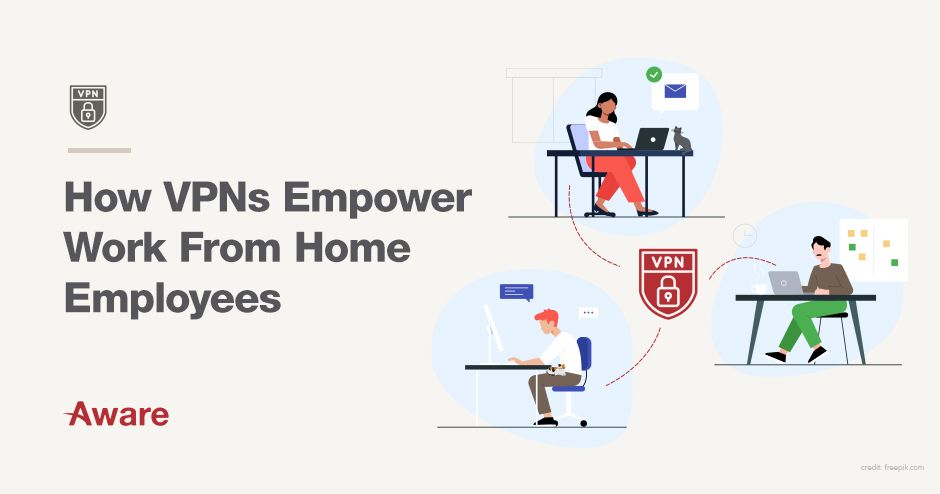
27 Mar How VPNs Empower Work From Home Employees


In these troubling times, where COVID-19 affects us all, more and more people will start working from home.
This puts additional stress on each employee as they have to make sure that they have the right equipment and working area in their home to ensure that they can continue to work with as little disruption as possible.
Once employees have done this, they then have to consider the new risks of working remotely from home using their own internet connection.
In other words, working from home can potentially open up a whole new set of online risks and challenges that many employees may not even consider.
For example, imagine you are an accountant working from home and you have to send sensitive financial information about other employees to your boss.
How can you be sure that just because your email says it was sent that the data wasn’t intercepted by some hacker who now has access to all of that sensitive information?
Most of the time you can’t be sure until it is too late.
And that’s why you need a VPN to protect your online activity whilst working from home.
What is a VPN?
A VPN stands for ‘virtual private network’.
It allows you to create a secure connection from your own internet connection to another network using the internet.
Think of it as ensuring that the information you send over the internet using a VPN is sent securely from your machine and arrives with that same security still intact for the recipient network.
That means, in our earlier example, using a VPN to connect to the internet and then sending the email of sensitive financial information to your boss means that the data cannot be intercepted as easily and is more secure and safe from prying eyes.
The funny thing about VPN’s that many people forget is that they were created solely with allowing employees to work from home.
VPN’s were created to make secure connections from home and business networks so that employees could access company resources securely online from home and be safe – perfect for the times that we live in!
Nowadays a VPN is used for more varied reasons. Such as accessing websites or services that may otherwise be blocked depending on your location.
Why do you need a VPN?
When you worked at your office, chances are you were regularly accessing the business network for files or information (such as access to shared network drives, or your email server) to do your job without giving it a second thought.
If the network was set up properly then it would mean that only computers or devices that your IT department had approved would be allowed to access those resources, which keeps all your company data safe.
But what happens when you go home and try to access those same resources?
Because your device is not approved, and you try to access those same resources or even access your email then you may not be able to.
This is because most IT departments block access to network resources based on the IP address of a device. Any device whose IP address isn’t on an approved list won’t have access.
It’s like not being on the guest list of your favourite club- you can’t come in.
And the reason that you no longer have access is because, at home, your IP address of your device will change.
So, first of all, and again, it depends on the configuration of your IT department, you ask them to add the IP address of your device whilst you are at home to the list of accepted devices for your company’s network resources and then you simply install a VPN to make that connection secure between your home and your office.
You may be wondering why this is needed.
Imagine you are a programmer working from home who works with the codebase of your latest killer app, or a tester who is testing an unreleased application for a client, and you need to access anything related to code repositories or QA testing then it makes sense that you connect to them through a VPN.
This is a needed step because, as you guessed it from our opening example, it stops the data being intercepted by hackers.
Similarly, if you are customer support working from home then using a VPN to connect to your customer support system also makes sense because it protects information that you share with customers and they share with you.
In both instances the VPN connection prevents the chance that sensitive company information that employees may take for granted every day whilst in the office doesn’t end up in the wrong hands whilst they are working from home.
Is It Easy to Set Up a VPN?
Setting up a VPN is a straightforward process.
It usually consists of the following steps, or at least something similar set out by your company’s IT department.
- Download and install the VPN software on to your computer.
- Enter your login details.
- Connect to the VPN.
Typically, when you are connecting to a VPN on your computer you will see an additional icon, either in your Windows taskbar or in the system tray next to the clock.
You can use this to see if you are correctly connected to the VPN or not, as well as to disconnect when you are finished working for the day.

Can I get a VPN for my phone too?
This depends on your IT department.
After all, for most companies, getting their employees to set up a VPN on their computer may be enough.
But many people also use their phones to do work tasks outside of the office – shouldn’t they be able to use a VPN too?
The answer is that, yes, they should be able to. But not all VPN programs support both computers and mobile devices. You need to speak to your IT department and ask them.
Does a VPN slow your internet connection down?
Whilst working from home the last thing you want is something to slow down the speed of your own internet connection.
Many people will say that a VPN does slow down your internet connection, and whilst that may be true, it isn’t as bad as you might think, and chances are you won’t notice any real difference.
When you connect to a VPN the speed of the internet that you get after connection depends on the location of the VPN sever you are connecting to.
If the VPN server you are connecting to is located in a country close to you then your internet speed won’t slow down as much as if you connected to a VPN server whose country was far away from you.
When working from home and using a VPN, chances are your IT department will choose the VPN program to use for you and configure it to connect to a VPN server location close to your location.
That means that you simply have to connect to it and then you can start working from home as normal and browse company internal resources as if you were there in the office and you won’t notice any reduction in speed.
How Can You Get Your Own VPN Whilst Working from Home?
As more and more companies start to implement a strict work from home policy your IT department should also start to get employees set up with a VPN. Not all employees may require a VPN though.
If they don’t access company resources, then a VPN may not be needed.
Each company’s IT policy will be different. Some may give VPN access to only certain employees; others may give VPN access to everyone.
You simply need to speak to your IT department and ask them.

Getting a VPN makes perfect business sense when working from home
In conclusion, if you are one of the many employees who is now working from home and who doesn’t use a VPN to access your company’s resources or data, then it’s recommended that you get one.
Speak to your IT department today and ask them to set you up with a VPN.
In these uncertain times we need to make sure that all our work activities and data remains secure now that we are working from home and using a VPN is the best way to do that.
Managed Virtual Private Server Solutions
Aware offers managed virtual private servers for businesses of all sizes. Contact us now to learn more.
- Boosting Workplace Efficiency with Microsoft365 Copilot in Thailand - January 31, 2024
- How to use the Google Datalayer to get your ecommerce data into Google Analytics - November 9, 2020
- How to Fix Common Google Shopping Issues - October 6, 2020
- How to perform A/B testing on your website using Google Optimize & Google Analytics - August 31, 2020
- How Using Heatmaps Can Help You Discover Hidden Ways to Increase Your Conversions in Google Ads - July 31, 2020
- How to Set Up Conversion Tracking in Google Ads Using Google Tag Manager - June 29, 2020
- Why Setting Up Remarketing in Google Ads Can Be the Quick Way to Success - June 29, 2020
- How to Get Started with SharePoint For Your Business Using Microsoft 365 - June 15, 2020
- Why Running a Google Ads Smart Campaign Is Not Always A Wise Choice - June 15, 2020
- How to Educate Your Work from Home Staff on Information Security - May 29, 2020
